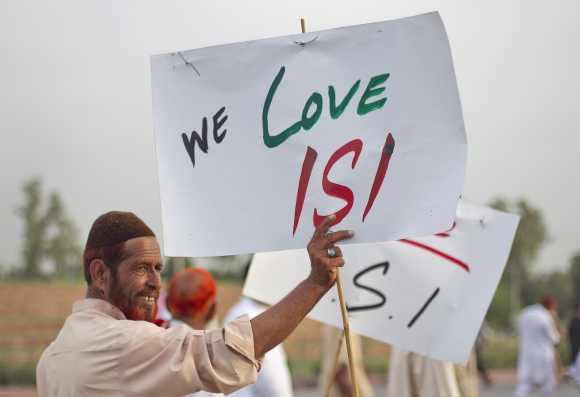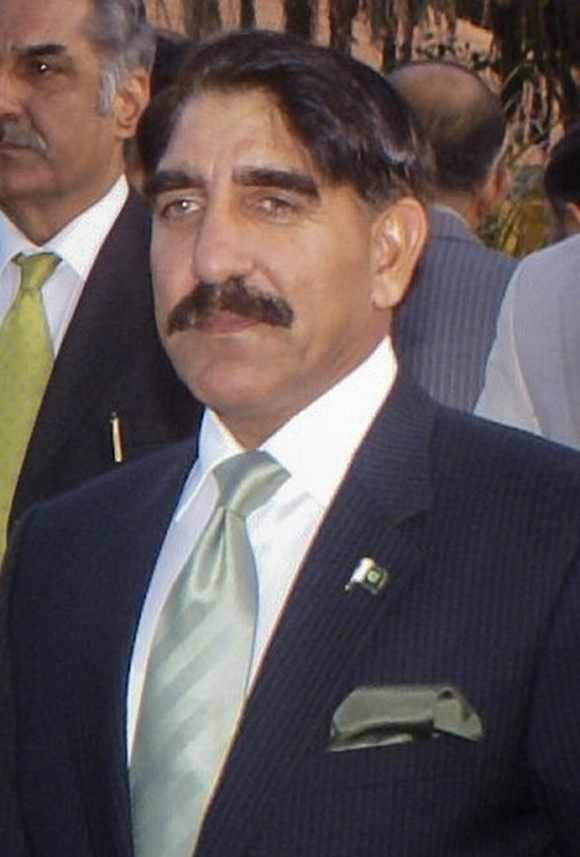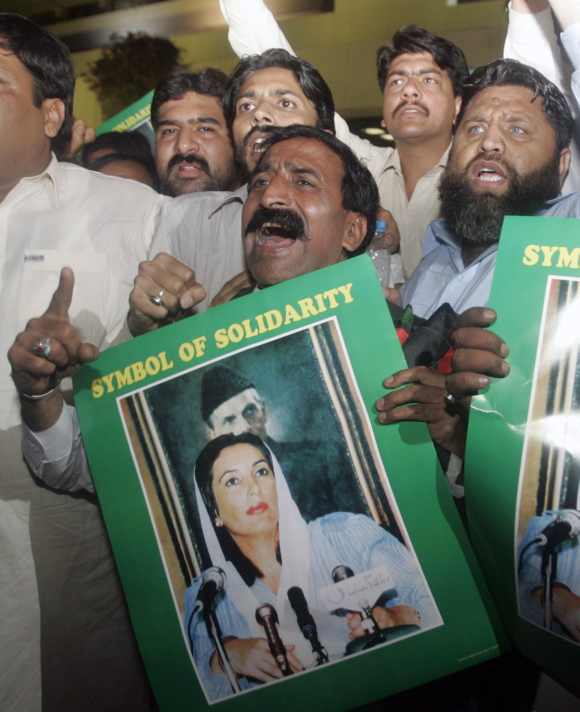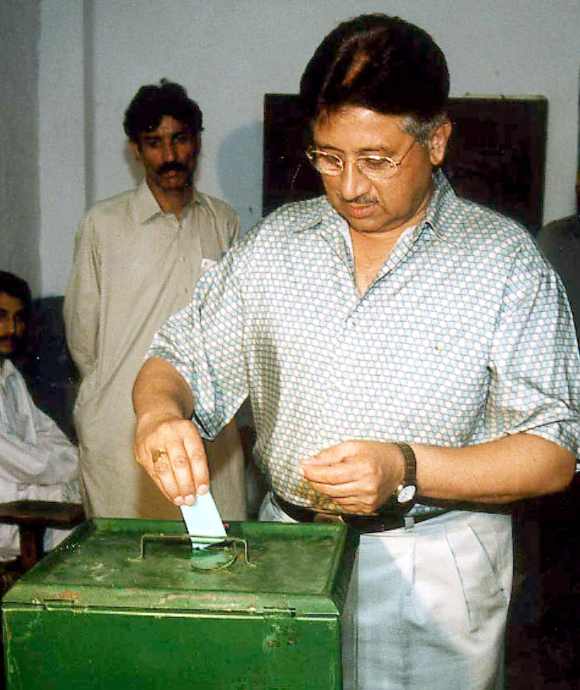 | « Back to article | Print this article |
Special: Pakistan government to finally clip ISI wings
Pakistan President Asif Ali Zardari plans to not only disband the political wing of the spy agency but also make it accountable to his country's parliament, reports Amir Mir
In an unprecedented move, the Asif Ali Zardari-led Pakistan People's Party government has decided to clip the wings of the all-powerful Inter-Services Intelligence through parliamentary legislation, which will not only disband the political wing of the spy agency but also make it fully accountable to the elected parliament and the civilian government.
It is for the first time in the 65-year history of Pakistan that a serious effort is being made to streamline the affairs of the ISI, which has always remained under criticism for encroaching upon the authority of the elected governments.
The ISI has always been accused of being actively involved in managing political activity both inside and outside the government and making or breaking political parties and political alliances for well over the past three decades. A 19-page draft of a bill has now been submitted in the upper house of the parliament -- the Senate -- by none other than Farhatullah Babar, the official spokesman of Zardari, which will be taken up during the next session of the house commencing Monday.
The political cell of the ISI has infiltrated into and manipulated Pakistan's politics and other influential areas of social life to such an extent that it seems an uphill task to revert it to its original mandate, to its basic role of just intelligence gathering.
However, the government has decided to tame the country's premier intelligence agency by disbanding its political wing, although a similar effort by the Zardari government had backfired in November 2008, hardly a few days after the PPP had assumed power following the general elections.
Click NEXT to read further...
ISI Act suggests the agency should be answerable to Parl, PM
The proposed Inter Services Intelligence Agency (Functions, Powers and Regulation) Act, 2012 suggests that the ISI should be answerable to the parliament and the prime minister. The Bill recommends internal accountability and a better discipline system within the ISI to put an end to enforced disappearances of civilians and victimisation of the political parties and their workers and leaders.
Giving the background of the proposed legislation, the bill says, 'The absence of appropriate legislation regulating the functioning, duties, powers and responsibilities of the agency is not consistent with the principles of natural justice and accountability of authority and power and has given rise to resentment against the premier national agency.'
Therefore, the Bill provides for a director general of the agency who shall be a serving or retired civil servant in BS-22 or of an equivalent rank in the armed forces to be appointed by the president on the recommendation of the prime minister and shall hold the office for four years.
The agency shall be directly under the prime minister and not under any ministry. The bill also envisages an intelligence and security committee of the parliament comprising nine members drawn from both houses of the parliament to examine matters relating to expenditure, administration and policy of the agency.
Under the proposed act, any employee of the agency found in any way working for the enemy, any terrorist or terrorist organisation, or for any criminal or organised criminal group, shall, on conviction, for every such offence be punished with imprisonment for a term which may extend to 25 years and with fine.
The employees of the ISI shall not be regarded as civil servants and a separate mode of taking disciplinary action against them for misconduct has been prescribed in the draft of the bill.
Although, the ISI has been greatly involved in politics since the 1970s, it was the internal (political) wing of the agency that was generally responsible for dealing with the political affairs -- including manipulation of the general elections, which is a known fact now.
Click on NEXT to read further...
ISI manipulated many general elections in Pakistan
Not long ago, a former head of the ISI's political cell Major General Ehtesham Zameer Jafferi had confessed to having manipulated the 2002 general elections at the behest of Pervez Musharraf. He had admitted in an interview that he was ordered by Musharraf to help the 'king's party' the Pakistan Muslim League -- PML-Q -- to come to power in 2002.
The former No 2 of the ISI had then called for the closure of the political cell, confessing that it was part of the problem due to its repeated involvement in forging unnatural political alliances, contrary to public wishes.
However, the 2002 elections were not the only ones to have been manipulated by the ISI. The agency had earlier been accused of manoeuvring the 1990 election results in favour of the Islami Jamhoori Ittehad or Islamic Democratic Alliance. A case in this regard is already pending with the supreme court of Pakistan.
The case had exposed the abuse of public funds by the military and intelligence agencies in order to manipulate political change in the country. The ISI prevailed upon politicians from different parties to trade their loyalties for a price, primarily to destabilise a hostile PPP government and then put in place a friendly government to be led by Nawaz Sharif. The scandal comprises the entire gamut of financial crimes like fake loans, kickbacks, illegal transactions and bribes and involves several high profile names of politicians and a serving army chief.
The case actually originated on June 16, 1996, from a letter by Air Marshal (retd) Asghar Khan to then Chief Justice Sajjad Ali Shah, asking him to take suitable action on then Interior Minister Major Gener (retd) Naseerullah Khan Babar's statement in the National Assembly. Babar said on the floor of the house, "The ISI collected some Rs140 million from Habib Bank Ltd and distributed among a number of politicians prior to the 1990 elections."
The letter was subsequently converted into a constitutional petition by the chief justice. According to the petitioner, he had sent the first letter with the sole purpose of exposing the role of the ISI in manoeuvring the election results and supporting its favourite politicians to fulfill political ends of the mighty military establishment. "You never know how many elections have been rigged and manoeuvred by the ISI in the past," Asghar Khan had stated in his letter to the chief justice.
Those made respondents in the case were Mirza Aslam Beg, former chief of army staff, retired Lt General Asad Durrani, ex-director-general of the ISI directorate, and Younis Habib, ex-chief of ex-Mehran Bank Ltd, then confined in Central Jail, Karachi.
In his written reply submitted to the supreme court, General Aslam Beg had conceded that it had been a routine for the ISI to support the favourite candidates in elections under directives of the successive chief executives.
He had stated in his reply, "The receipt of Rs 140 million by the ISI from Younas Habib in 1990 was under the directions of the chief executive. The ISI director-general also informed me that funds so received were properly handled and the accounts were maintained. I had also briefed the then president of Pakistan Ghulam Ishaq Khan on the issue".
The election was subsequently won by the IJI led by Nawaz Sharif, who had allegedly received billions of rupees from the ISI for his election campaign
Click on NEXT to read further....
Hours before assassination, Bhutto was trying to expose ISI
The ISI's interference in national politics and in engineering the general elections can further be gauged from the fact that hardly hours before being assassinated on December 27, 2007, Pakistan's twice-elected PM Benazir Bhutto was trying to expose a suspected ISI operation to rig the upcoming general 2008 elections.
The day she was assassinated, Benazir was in the process of collecting information about a rigging cell allegedly established at a safe house of the ISI in Islamabad which was tasked to change the election results in favour of the Musharraf-backed Pakistan Muslim League on the day of the election.
Bhutto was informed by one of her close aides on December 25, 2007 in an e-mail message sent on her e-mail address -- sazdubai@emirates.net.ae -- that the Musharraf regime has set up a special cell to engineer the 2008 elections. She was further informed that the cell headed by one Brigadier (retd) Riazullah Khan Chib was working in tandem with the Intelligence Bureau Director General Brig (retd) Ejaz Hussain Shah and has been tasked with changing the election results.
The information she received said that the so called election monitoring cell would ensure that stamped ballot papers in over one hundred constituencies of Punjab and Sindh are all set to be polled on January 8 in favour of the 'Queue' League candidates.
The information further said that the provincial headquarters of the ISI and IB would ensure that the ballots are polled in a smooth manner at the ghost polling stations in the district headquarters of Punjab and Sindh and counted in the final count before the official election result is handed over to the successful candidates by the presiding officers.
'All this is being done because of the fact that Musharraf simply can't afford a hostile parliament as a result of the 2008 polls,' the information passed on to Bhutto had stated.
In her reply, which Bhutto sent from her BlackBerry the same day -- December 25 -- she wrote, 'I was told that the ISI and the MI (military intelligence) have been asked not to meddle. But I will double check'.
In her second message to the same confidant a day later on December 27 at 1:12 pm -- five hours before her assassination – Bhutto wrote, 'I need the address of the safe house [in Islamabad] as well as the phone numbers of the concerned. Pl (please) try and obtain ASAP (as soon as possible). Mbb (Ms Benazir Bhutto), Sent from my BlackBerry® wireless device'.
The confidant wrote back at 3:06pm the same day, 'I have re-checked the information with the same source which earlier said the ISI and the MI have been asked not to meddle. The source claims Brig Riazullah Khan Chib retired from the ISI a few months ago but was re-employed, since he belongs to the arm of the artillery and is considered close to Musharraf who too comes from the same wing of the army. The source says Chib's cover job is somewhere else but he is actually supervising a special election cell, which is working in tandem with the chief of the Intelligence Bureau.'
'I have further been told that Brigadiers Ejaz Hussain Shah and Riazullah Chib are close friends because of their having served Punjab as the provincial heads of the ISI and the Punjab regional director of the anti narcotics force respectively in the past. Both are considered to be loyalists of Chaudhry Shujaat Hussain, the president of the PML-Q,' he added.
Click on NEXT to read further...
Bhutto was to make public Musharraf regime's rigging plans
The rigging cell/safe house in question is located on Shahra-e-Dastoor, close to the Pakistan House bus stop in Sector G-5 of Islamabad. It is a double-storey building, without inscribing any address, as is the case with most of the safe houses. The cell consists of some retired and serving military and intelligence officers, which will show its magic on the election day,' read the message sent to Benazir Bhutto hardly three hours before her assassination outside Liaquat Bagh in Rawalpindi where the first Pakistan PM Liaquat Ali Khan was assassinated on October 16, 1951, after being shot in the chest twice from close range during a public meeting.
'Let me further inform you that Musharraf had granted Sitara-e-Imtiaz military (military distinction medal) to Brig (Retd) Riaz Chib on December 17, 2007, for his meritorious services in operational field. Before his retirement, Riaz Chib was in charge of the ISI-led joint intelligence bureau, which used to deal with the internal security matters, Azad Kashmir and Gilgit and Baltistan,' it said.
Benazir Bhutto was killed before she could make public the alleged rigging plans of the Musharraf regime.
The day she was assassinated, Benazir Bhutto was due to meet two senior American politicians to show them a confidential report, compiled on the basis of information ascertained by Bhutto's own contacts within the Pakistani security and intelligence services, and alleging that the Musharraf administration was using some of the $10 billion in the United States military aid that Pakistan has received since 2001 to rig the 2006 elections.
Patrick Kennedy, a Democratic Congressman for Rhode Island, and Arlen Specter, a Republican member of the Senate sub-committee on foreign operations, were scheduled to have a dinner meeting with Bhutto on December 27 during which they were to be provided this report.
According to a January 1, 2008 news report, published by the British newspaper The Times, Bhutto's husband Zardari had confirmed the existence of the report, its basic contents and his late wife's plans to meet the US lawmakers.
Asked if such a report was in his possession, he said, "Something to that effect." Asked if the report contained evidence that the ISI was using US funds to rig the elections, Asif Zardari had said, "Possibly so."
He declined to give further details, but said the confidential report could have been one of several motives for killing Bhutto. "It was a general combination of all of these things. The fact that she's on the ground exposing everybody, I guess, would have been one reason. There are many views and many reasons one can think of for her assassination."
Click NEXT to read further...
TOP photo features of the week
Click on MORE to see another set of PHOTO features...





